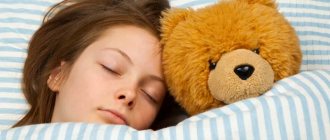Sleep is a physiological state that repeats regularly, every day. It helps the body to relax, gain strength, and restore immunity. To maintain health, a person should sleep on average 8 hours a day.
This duration may vary depending on age. Babies sleep for up to 19 hours, and older people can get by with 7-9 hours.
Deterioration in sleep quality always affects your well-being. Chronic disorders affect the health of the central nervous system. This is fraught with numerous physiological and mental pathologies.
Sleep quality can decrease for various reasons. Some of them we cannot control. But there are also some that you can eliminate on your own. Knowing them can help you improve your night's rest without resorting to therapy.
Forms of sleep deterioration
A sleep disorder associated with lack of sleep is called insomnia. In everyday life we call this insomnia. It manifests itself:
- difficulty falling asleep;
- frequent night awakenings;
- lack of feeling of vigor after sleep.
A person may feel that they slept superficially, which is no less exhausting than prolonged wakefulness. After all, deep sleep is no less important than long sleep. Spending the required amount of time in bed does not guarantee proper rest.
While some people complain about insomnia, others cause anxiety among loved ones by not waking up for 10 or more hours. Sleeping too long is equally harmful. This negatively affects performance and general well-being, and is therefore also considered a violation.
Nature of Dream
Night sleep occurs in two alternating phases. One of them is the phase of rapid eye movement or REM (from English Rapid Eye Movement - rapid eye movement), this is active sleep, where most dreams occur. The other phase is slow sleep or non-REM , when the body enters a very deep sleep, and at this stage the body recovers. During the night, the phases alternate in a cycle individual to each person. There is a misconception that for normal sleep it is necessary to improve the quality of the deep phase. This is not true: high-quality sleep is complete sleep, with all successively changing phases .
Symptoms of insomnia
Normally, a person goes to bed and falls asleep within half an hour. If you cannot fall asleep during this period of time, we are talking about presomnia disorders - there is reason to suspect insomnia. Intrasomnia disorders occur if a person wakes up in the middle of the night. However, if he opened his eyes for a minute and fell asleep again, this is not considered a pathology.
Post-somnia symptoms (associated with awakening) are the most difficult to recognize. From a scientific point of view, we can talk about them if a person wakes up 30 or more minutes earlier than he should. But when he should do this is also a question, because opportunities do not always coincide with needs.
It is impossible to definitively diagnose “insomnia” based on how long the patient sleeps. Although a duration of less than 6.5 hours is considered a deviation, the needs of the body cannot be ignored. For some, 5 hours is enough to recover.
Types and causes of insomnia
Like most diseases, insomnia is divided into acute and chronic. Acute lasts no more than three months and comes in three types:
- transient, caused by emotional overexcitement due to upcoming events (falling in love, exams, examination);
- adaptation, provoked by psychological shocks that have already occurred (loss of job, moving, death of loved ones);
- unspecified, when it is impossible to accurately determine the mechanism of development.
Chronic insomnia is recognized if it lasts more than three months. It is always associated with somatic diseases, and in half of the cases it is accompanied by mental disorders. Insomnia affects people with diseases of the genitourinary system (the urge to wake up at night) and dermatological ailments that cause itching. Any pain prevents you from sleeping peacefully.
What vitamins are needed to heal the nervous system?
To improve the nervous system in case of sleep problems, the doctor selects vitamin complexes, which include minerals, microelements and macroelements. Group B vitamins have a beneficial effect on the nervous system, which immediately improves balance and metabolic processes in the body.
The choice of vitamins depends on the diagnosis made by the doctor. For example, disturbed sleep during periods of stress leads to the use of complexes that replace folic acid, vitamins B1, B6, B9, C, as well as minerals (potassium, magnesium, saliva). Because neurosis and insomnia during pregnancy are to blame, women are not recommended to engage in sexual activities. Depending on the diagnosis of pregnancy, it is important to select antidepressants that are gentle on the fetus.
The difficulty of taking vitamins should be discussed with a doctor, especially for people who have been diagnosed with problems with the nervous system, as well as those who have problems with stress and heart problems.
0
1
1
Stat rating:
5 out of 5 based on 2 ratings
Author: Karaban Victoria Sergievna
Physician-neurologist. First category. Work experience over 15 years.
Factors that affect human sleep
Deterioration of sleep can be caused by diseases, the situation is normalized by treatment. But there are also factors that come from outside, and a person himself allows their influence:
- Artificial light. Insufficient darkness, family members sitting in front of the computer or TV, gadgets in bed - all this makes it difficult to fall asleep.
- Load in the evening. There is no switch in the body, so it goes to sleep gradually, and not at once.
- Night shift work. It disrupts the natural biological rhythm. Normally, people sleep when it is dark and are awake when it is light. For night workers the opposite is true.
- Nervous shocks. Stress excites the nervous system. She goes into a special activity mode and postpones the prescribed rest.
The fear of insomnia will not let you fall asleep. If a person knows it firsthand, he lies in bed, fearing another painful night. And here the aforementioned stress comes in, exciting the central nervous system.
Material factors affecting sleep
Above we looked at 5 intangible causes of insomnia, but there are also material ones. Managing them is in our hands, in every sense of the word. First of all, this is unsuitable bedding. Unpleasant tactile sensations force you to concentrate on yourself - you won’t be able to get enough sleep because of them.
To avoid deterioration of night's rest, it is better not to consume in the evening:
- Coffee and chocolate. The caffeine contained in both products inhibits the production of melatonin, the hormone responsible for falling asleep.
- Medicines that stimulate the central nervous system. These can be nootropics, antihistamines, antipsychotics. (sold by prescription)
- Alcohol (especially to help you fall asleep faster). The habituation factor plays a role here. Without additional funds, the body is no longer able to go into rest mode.
It is also better to avoid heavy meals in the evening. The fattier the dinner, the longer it will take to digest it. Until this happens, the body will not go into rest mode.
Who is prone to insomnia
Some personal characteristics become predisposing factors to the formation of insomnia. A habitual pattern of behavior and way of thinking can cause overexcitation of the nervous system, interfere with falling asleep and force you to wake up. And when a provoking factor is added to this, the problem gets worse.
Personality traits associated with insomnia include:
- perfectionism;
- anxiety;
- hypochondria;
- tendency to reflect;
- the desire to suppress emotions.
Insomnia is sometimes viewed as a reflection of chronic stress. According to research, people with low levels of happiness or lack of pleasure are prone to it.
Performance and sleep
During wakefulness, the brain uses up its energy reserve. During rest, while the excitability of neurons is reduced, it is restored. If you don’t let a person get enough sleep, this won’t happen, and in the morning he will be no less (and sometimes more) tired than in the evening.
As a result, performance, especially mental performance, and overall quality of life suffer. This manifests itself in:
- feeling tired;
- deterioration of coordination;
- attention disorders;
- memory loss;
- difficulties in mastering skills.
A sleep-deprived employee is significantly less productive than a fully rested employee. During the day, he may switch off briefly, although this sleep is unlikely to be deep. This is fraught not only with errors in work, but also with the risk of injury at work.
Let's talk about the menu? Be smart about your drink and food choices throughout the day.
Our bodies are powerful machines that need fuel to keep moving. And the better the food, which is also fuel, the better and longer the body will work for us. But food is not only important as a source of daily energy, it is very important that food has an impact on a quality night's sleep. Just think about that night when you had a very greasy dinner right before bed, how did you feel the next morning? Proper nutrition is a powerful sleep aid and should not be ignored.
What happens to our body at night?
We spend a considerable part of our lives sleeping. If you think that at night the body just rests, then you are mistaken. Did you know that at night the body is cleansed of toxins and cells are restored? Metabolism also continues, only at a slower pace. Throughout the day, food is converted into energy for the muscles. When we sleep, our energy needs decrease, and our inactive state prevents enzymes and stomach acids from converting food into energy reserves.
To eat or not to eat before bed?
This is the key question. But is this the right question to ask? Instead of asking whether we should eat before bed or not, it is better to ask what to eat and when. The general recommendation is that at least two hours should pass between the last meal and bedtime. One of the reasons for this recommendation is that the stomach does not work as intensely during sleep as during the day, and this can cause digestive problems, for example, acid reflux (reflux of acidic stomach contents into the esophagus - causing very unpleasant sensations).
But there's another good reason why eating before bed isn't a good idea. Let's face it, the last thing you eat before bed is usually a snack. This means you're likely consuming not only extra calories, but also empty calories because you're eating extra food. And by doing this you create a bad habit, which ultimately leads to poor sleep. It is an absolute fact that how we sleep at night depends on what we eat during the day.
What foods improve sleep?
The main thing is to eat something that does not create a feeling of heaviness in the stomach. Let’s look at the “dos” and “don’ts” that you can follow.
CAN
Choose light meals such as salad, omelet, cottage cheese, turkey and vegetable soup. Fish is an excellent source of vitamin D and omega-3 fatty acids, which have properties that improve sleep quality. Due to their high glycemic index, which causes drowsiness, white rice and oats can also be included in the evening diet.
There are several natural foods that improve sleep because they contain melatonin, a hormone that helps control the body's biological clock. One of them is cherry
, many scientific sources suggest drinking cherry juice for overall health as well as improved sleep.
almonds
before bed , which, in addition to melatonin, is a source of magnesium.
Drink a cup of chamomile tea
, not only as a sedative: this tea contains antioxidants, which can promote drowsiness and improve sleep.
IT IS FORBIDDEN
Acute
or
fatty foods
cause problems at night and disrupt sleep.
These foods can cause digestive problems such as acid reflux or heartburn. Keep in mind that alcohol and caffeine
can have a significant impact on your sleep, so for a good night's sleep, avoid consuming them in the evening. To sleep better, avoid sugar, not just before bed, but throughout the day. Refined sugar can disrupt sleep because it causes spikes in blood glucose levels.
Try to take notes on what you eat during the day and how it affects your sleep at night. This way you can find out how the body reacts to different types of food and how this affects your sleep.
Ways to improve sleep quality
A good night's rest ensures good health, high performance and emotional comfort. If insomnia is a symptom of any disease, treatment should not be delayed. And if it is caused by external factors, it is worth taking care of sleep hygiene:
- sleep at night, not during the day;
- wake up and get up at the same time - even on weekends and on vacation;
- ensure darkness - turn off the lights, draw the curtains, do not allow household members to remain in front of screens;
- relax in bed - don’t think about business, don’t pick up your smartphone, don’t watch heavy movies;
- regulate the temperature in the bedroom - optimal - 17 degrees.
If you suddenly wake up in the middle of the night and cannot fall asleep, it is better to get up for a while. You can walk around the apartment, sit in another room, the main thing is not to start vigorous activity.
Basic rules for healthy sleep
What can you do to ensure that your night's rest is refreshing and replenishes your strength? We offer you to familiarize yourself with the rules of healthy sleep.
- Eliminate caffeine.
We are talking not only about coffee, but also about energy drinks. A cup of invigorating coffee is allowed in the morning, but not in the afternoon. - Stop smoking.
Tobacco smoke causes a sore throat and swelling of the mucous membranes. This leads to discomfort during sleep even in healthy people, and in the presence of obstructive apnea syndrome it becomes a real threat to health. - Leave the bedroom for sleeping.
Don't turn your bedroom into a multi-purpose room. A TV, laptop and even a mobile phone are not the best guides to the Kingdom of Morpheus. Therefore, you should not watch movies, read the news on your tablet, or work right in bed. You should develop a strong association: a bedroom is for sleeping. - Get physically active.
After physical activity, the body needs to recover. And the best way to do this is to sleep. That's why after training, sleep comes as soon as your cheek touches the pillow. True, you need to do physical exercise at least 2-3 hours before your night's rest. Otherwise, the nervous system will be overexcited, and you will not be able to fall asleep quickly. - Don't overeat, especially at night.
Firstly, falling asleep after a hearty dinner is not easy. Secondly, this is a sure path to obesity. Fat deposits in the neck narrow the throat, which increases snoring and increases the risk of sleep apnea. - Ventilate the room.
Most people sleep better in a cool room. If possible, install the temperature sensor at 18-21°C. Or at least ventilate the room well before going to bed. - Eliminate sound stimuli.
Silence is one of the conditions for healthy sleep. If it is not possible to eliminate all sounds, try controlling the situation with white noise (such as an audio recording of wave noise) or using earplugs.
Medicines to improve sleep quality
It is necessary to get enough sleep from both physiological and psychological points of view. A couple of sleepless nights due to jet lag or important life events is not a cause for concern.
But if problems with falling asleep and frequent awakenings occur more than three times a week for a month, a person needs help. A good place to start is by improving hygiene. When it becomes obvious that these measures do not help, you will have to resort to medication.
It is better to take medications under the supervision of a doctor. To select them correctly, it is important to determine:
- cause of insomnia;
- her character;
- the required duration of action of the drug.
Sleeping pills provide quality deep sleep by suppressing interneuronal transmission. They also calm the nervous system and relax muscles.
What helps calm the nervous system?
If insomnia is blamed on neurosis, stress and other pathologies, it is necessary to calm the nervous system using other means, such as medicine. You cannot take drugs or other drugs without a prescription without a prescription. Self-destruction leads to disgusting self-esteem, the development of new illnesses.
Why does sleeplessness of a stationary nature occur? There may be many reasons for this problem and it is better to seek help from a doctor. In certain situations, people need comprehensive attention from a neurologist and psychologist.










